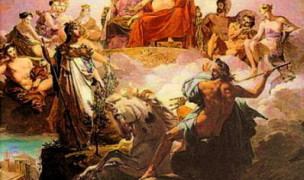 20 Terms
20 TermsHome > Industry/Domain > Anthropology; Religion > Mythology
Mythology
The term mythology can refer to either the study of myths, or to a body of myths. Comparative mythology is the study of connections between myths from different cultures. In the study of folklore, a myth is a sacred narrative explaining how the world and humankind came to be in their present form. Many scholars in other fields use the term "myth" in somewhat different ways. In a very broad sense, the word can refer to any traditional story.
Industry: Anthropology; Religion
Add a new termContributors in Mythology
Mythology
Váli
Anthropology; Mythology
Norse god who is the son of Odin and the giantess Rindr. He was conceived for the purpose of slaying Hodur after he killed his brother. He grew to adulthood in a single day to complete this task. In ...
Gungnir
Anthropology; Mythology
A magical spear belonging to Odin. At the beginning of the Ragnarok, Odin will lead his forces into battle and the first attack will be struck by Odin on Fenrir using this spear. It has the ability ...
Mjölnir
Anthropology; Mythology
Thor's mighty hammer. It possess many magical qualities, including the ability to level mountains in a single blow, and to never miss its target. Its origins are unclear, but the most popular version ...
Thor
Anthropology; Mythology
One of the most prominent Norse gods, Thor is the god of lightning, storms, strength and healing. He wields the hammer Mjölnir which has the ability to strike enemies with thunderbolts. In Nordic ...
Odin
Anthropology; Mythology
One of the principal gods from the Norse pantheon. He rules over Asgard and is associated with war, victory, magic and poetry. He has many deity sons, including Thor and Meili. Odin is considered to ...
Mímir
Anthropology; Mythology
A Norse god who was beheaded during the Aesir-Vanir war. The head part survived, and Odin took to carrying it around as it would dispense valuable advice.
Meili
Anthropology; Mythology
A son of Odin and brother of Thor. No mentions of his acts are given in either the Prose Edda or the Poetic Edda.


